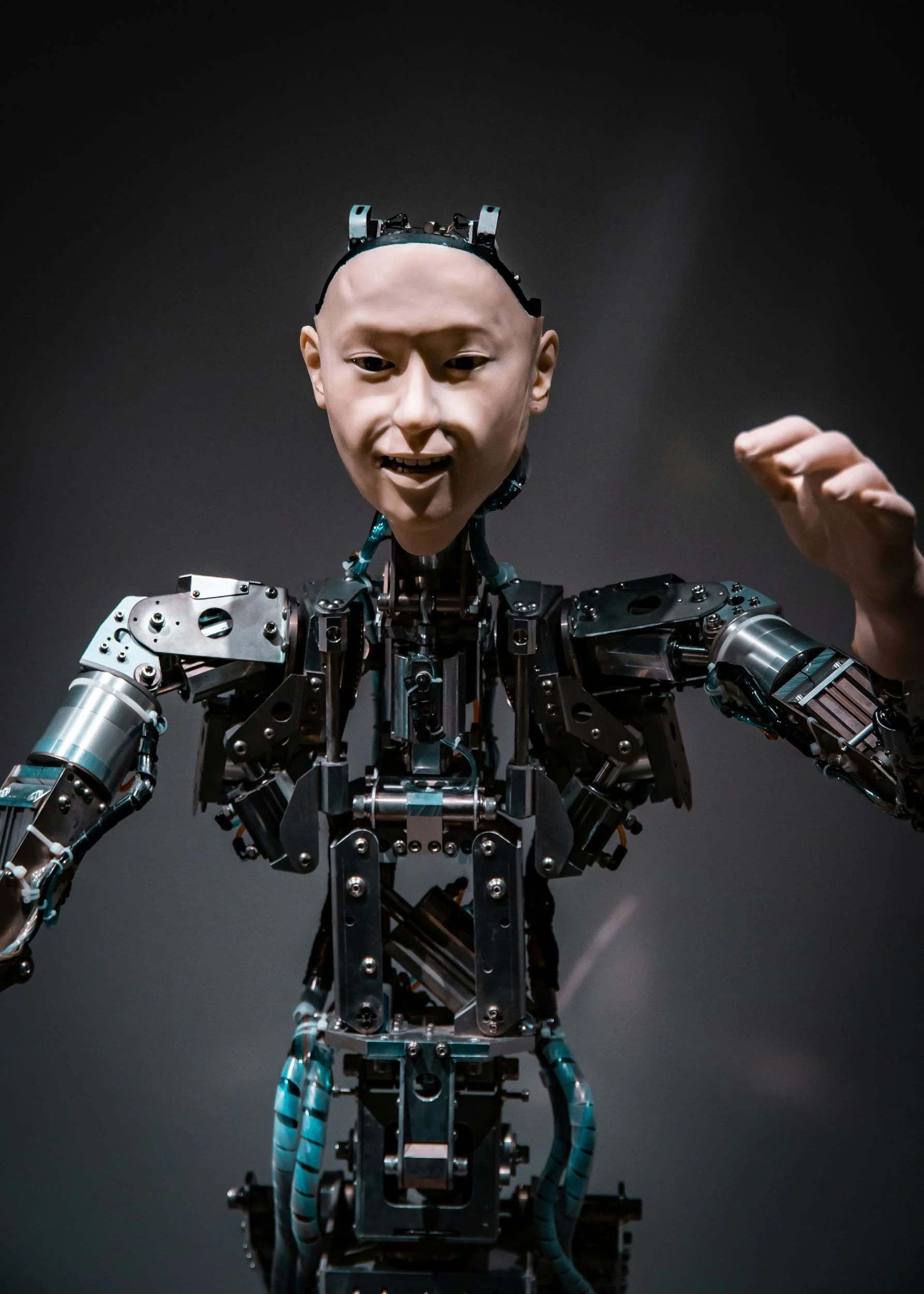12 Jobs That AI Can't Replace (and Why They'll Always Need Humans)
A few years into my role scaling operations at Lending Club, we ran a marketing A/B test that seemed simple on paper: send prospective customers either a direct mail piece with a 1-800 number to speak with a real person, or send them straight to our website to apply online. The digital route was faster, cheaper, more scalable-everything Silicon Valley taught us to optimize for.
The results surprised everyone. We were flooded with inbound calls from people who "just wanted to speak with someone." Not because the website was confusing. Not because they couldn't figure out the forms. They wanted to be heard. They wanted to know if a real company stood behind the offer. They wanted human connection-especially when making a major financial decision.
That pilot turned into a 100+ person team and taught me something I carry into my coaching practice today: when it matters most, people choose human connection.
Why This Question Matters Now (And Why the Panic Is Overblown)
If you're a professional in Phoenix or Scottsdale navigating today's AI-saturated job market, you've probably asked yourself: Is my job safe? Should I be worried?
Here's what the panic-merchants won't tell you: most jobs aren't going anywhere.
Yes, AI is transforming industries-including here in Arizona's booming tech corridor. But the evidence shows that certain careers aren't just surviving, they're thriving. The World Economic Forum projects 170 million new jobs created by 2030 -that's a net gain of 78 million jobs even after accounting for displacement.
The common thread in careers that will always need humans? They all leverage skills that AI fundamentally cannot replicate.
As someone who spent 15+ years in tech leadership watching automation tools evolve, I can tell you this: AI is powerful at pattern recognition and data processing, but it falls apart when work gets messy. The parts that require reading a room, making a judgment call with incomplete information, or simply showing up with empathy when someone's scared? AI can't touch that.
What I Learned Scaling Tech Teams in our AI Era
Here's what I noticed leading teams most recently at Mosaic and Inclined: AI excels at replacing repetitive, rules-based tasks-data entry, basic reports, simple code snippets.
But when it came to moments that actually moved the business forward? AI couldn't touch it.
I remember a product manager who could walk into a room where engineering and business were deadlocked, ask three questions, and suddenly everyone saw the path forward. That's not pattern recognition-that's reading people and knowing which question unlocks the room.
Or the customer service lead who could hear fear in someone's voice and know they weren't calling about a loan-they were calling because they were scared about losing their house. She'd shift the entire conversation in seconds. No chatbot could do that.
Stanford research confirmed what I saw: while AI affected entry-level workers in certain roles, employment in fields requiring hands-on care, physical presence, and human judgment held steady or grew.
AI struggles with the "messy middle" of human work-reading rooms, adapting on the fly, making ethical calls with no clear right answer.
This isn't theory. It's what separates careers that thrive from careers that get automated.
The 4 Human Superpowers AI Can't Replicate
MIT's Sloan School introduced the EPOCH framework, identifying five core human capabilities that create a protective advantage against AI replacement-skills AI fundamentally cannot replicate. I've distilled these into four practical categories:
1. Emotional Intelligence and Authentic Presence
AI can detect basic emotions but cannot truly empathize, build trust, or form authentic human connections. This is why DeepMind's CEO admitted, "AI could replace doctors, but not nurses"-the emotional labor of care cannot be automated.
2. Physical Dexterity and Environmental Adaptation
Jobs requiring arm-hand steadiness, finger dexterity, and real-time adaptation to unpredictable physical environments face substantially less AI exposure. Robots can't navigate construction sites or troubleshoot electrical issues in old Phoenix buildings with the same flexibility humans bring.
3. Creative Vision and Strategic Thinking
While AI can generate content by recombining patterns, it fundamentally lacks original thought and cultural intuition. The strategic facets of creative work-art direction, storytelling, design taste-remain distinctly human.
4. Ethical Judgment in Ambiguous Situations
AI can process information but lacks the moral framework required for truly ethical decisions when situations are complex or involve competing values. Leadership, counseling, and crisis intervention will always require human judgment.
12 Careers That Will Always Need Humans
Based on comprehensive research from MIT, Stanford, Yale, and the World Economic Forum, here are the careers most resistant to AI automation-organized by the human superpowers they leverage.
⚡ Quick Scan
Empathy: Healthcare, Mental Health, Teaching, Coaching
Physical Skill: Skilled Trades, Therapists, Emergency Responders
Creative Vision: Writers, Designers, Leaders
Human Judgment: Social Workers, Speech Pathologists
Empathy & Emotional Intelligence
1. Healthcare Practitioners: Nurses, Doctors, Physician Assistants
Nursing requires bedside manner, compassion, touch, and the ability to adapt to dynamic patient needs. Nurse practitioners score 95 on empathy assessments and are projected to grow 40-45% by 2032. Healthcare has the lowest AI adoption rate (15%) precisely because patient care demands authentic human connection.
2. Mental Health Professionals: Therapists, Counselors, Social Workers
Trust, lived experience, and the ability to interpret nuanced verbal and nonverbal cues are irreplaceable in therapy. Recent research from Stanford and Brown University (October 2025) revealed that AI therapy chatbots show increased stigma toward conditions like schizophrenia and "systematically violate mental health ethics standards." Coaching and counseling require authentic human presence that no algorithm can duplicate.
3. Teachers and Educators
Teachers support students through social, emotional, and developmental challenges requiring empathy, intuition, and real-time adaptive instruction. Stanford research confirmed education roles held steady or grew even as AI-exposed jobs declined.
4. Coaches and Personal Development Professionals
Whether it's life coaching, executive coaching, or career transition coaching in Phoenix, these roles depend on building trust, asking powerful tailored questions, strategizing, and holding your client accountable to take action.
I'll be direct: this is why I transitioned from tech leadership into life and career coaching. I watched too many smart, capable people stay stuck-not because they lacked information (Google has that), but because they lacked someone who could see their blind spots, challenge their assumptions, and hold them accountable to what they said they wanted.
A client recently told me, "I could've Googled all the career advice you gave me. But I wouldn't have done any of it without you in my corner." That's the difference. The accountability, emotional support, and personalized frameworks coaching provides cannot be replicated by AI-it requires human-to-human connection and authentic presence.
Physical Skill & Environmental Adaptation
5. Skilled Trades: Electricians, Plumbers, HVAC Technicians
Trade jobs thrive on manual dexterity, hands-on problem-solving, and adaptability to unique environments. Goldman Sachs stated that "'hard labor' jobs, such as plumbing and electrical work, cannot be replaced by AI."
Here in Phoenix, try programming a robot to diagnose an HVAC failure in a 1970s Scottsdale home when it's 115 degrees outside and the ductwork is custom. That takes experience and intuition AI can't replicate.
Nvidia's CEO predicted that "electricians, plumbers, and carpenters will be needed by the hundreds of thousands" as AI infrastructure booms. Of all the trades, electricians might have the best outlook—they have massive demand, low educational barriers to entry, and six-figure potential within just a few years.
6. Construction Managers
On-the-ground project leadership requires coordinating people, negotiating with subcontractors, and adapting to obstacles-all requiring flexibility and social intelligence. With 94% of construction companies citing worker sourcing as their greatest challenge, skilled leadership in Phoenix's construction boom is invaluable.
7. Physical & Occupational Therapists
These healthcare professionals blend clinical knowledge with hands-on motivation, real-time adaptation, and physical intuition. Physical therapists show 14% job growth, while occupational therapists show 11% growth-both much faster than average. Recovery requires encouragement and personalized human touch.
8. Emergency Responders: EMTs and Paramedics
Emergency situations require courage, improvisation, and emotional composure. Responders face high-stakes scenarios where training combines with human judgment to save lives-roles that will never be automated.
Creative Vision & Strategic Thinking
9. Creative Professionals: Writers, Designers, Art Directors
While AI can generate content by recombining patterns, it fundamentally lacks the strategic cultural intuition and original vision that drives authentic creative work. The "lived experience" that informs truly innovative creative decisions-understanding cultural context, emerging trends, human emotion, taste-cannot be automated. Creative leadership roles like Creative Director and Project Manager are actually becoming more valuable with AI, as they require strategic thinking beyond pattern recognition.
10. Leadership and Executive Roles: CEOs, Executives, Managers
Leadership hinges on vision, strategic thinking, motivating teams, and making judgment calls in ambiguous situations. Leadership requires weighing complex factors, considering moral implications, and making calls when there's no clear right answer-skills AI fundamentally lacks.
Complex Human Judgment
11. Social Workers
From crisis intervention to helping at-risk populations, social workers require emotional intelligence, cultural sensitivity, and the ability to build rapport in vulnerable moments. Navigating ethical dilemmas and providing human support in crisis situations cannot be automated.
12. Speech-Language Pathologists
Helping people recover communication skills demands empathy, encouragement, and tailored therapy. These professionals provide personalized interaction that AI cannot duplicate, consistently ranking among AI-proof careers with strong growth.
What This Means for Your Career
If you're reading this and wondering, "Okay, but what about my job?" - here's the practical takeaway:
Stop trying to compete with AI. Start leveraging what makes you irreplaceable.
The careers on this list share common threads: empathy, hands-on skill, creative vision, ethical judgment, and authentic human connection. These aren't just job requirements-they're career insurance in the AI era.
As a career transition coach working with Phoenix and Scottsdale professionals, I help clients identify their own "AI-proof" strengths. The skills that feel most effortless to you-the ones you barely think about-are often exactly the human superpowers that will differentiate you.
Identify your hardwired strengths. Can you read a room instantly? Solve physical problems with your hands? See creative solutions others miss? Make people feel heard? Those are your edges.
Double down on human skills. Emotional intelligence, adaptability, and creativity aren't "soft skills"-they're essential career assets. The World Economic Forum confirms that 39% of workers' key skills will change, but human skills remain critical.
Position yourself where AI augments, not replaces. The smartest moves are toward roles where AI makes you more effective, not obsolete-like therapists using AI scheduling or electricians using AI diagnostics.
Here's the truth most career advice won't tell you: you don't need to reinvent yourself. You need to recognize what you already do that AI never will.
The Bottom Line
The data is clear: careers rooted in empathy, hands-on skill, creative vision, and human judgment aren't just surviving-they're thriving.
If you're a professional in Phoenix or Scottsdale feeling uncertain about your career path in the AI era, remember this: no one can compete with you being authentically you. Your human edge-your empathy, creativity, judgment, presence-is your greatest career asset.
But here's the thing: you can't leverage what you can't see clearly.
Stop guessing where you fit. If you're navigating a career transition, feeling stuck in a role that doesn't use your strengths, or wondering how to position yourself in the AI era, let's identify your AI-proof strengths in one focused session.
Ready to Transform Your Life? Start With a Free Consultation
The most successful people don't wait for perfect conditions—they take action when they recognize an opportunity. If you've read this far, you're already considering whether coaching might be the catalyst you need to reach your next level of success and fulfillment.
Take the first step today by scheduling a free 60-minute consultation call with coach Jeff.
This is a no obligation call to see if coaching is right for you! Your future self will thank you for taking this crucial step today.
Frequently Asked Questions
What careers are safest from AI?
Careers requiring empathy, physical dexterity, creative vision, and ethical judgment are safest from AI. Healthcare practitioners, skilled trades, teachers, coaches, and creative professionals rank among the most AI-resistant careers based on MIT, Stanford, and World Economic Forum research.
Will AI replace coaching?
No. Coaching depends on building authentic trust, providing accountability, and asking powerful tailored questions-all skills requiring emotional intelligence and human presence that AI cannot replicate.
How do I develop AI-proof skills?
Focus on strengthening emotional intelligence, creativity, adaptability, and hands-on problem-solving. Consider working with a career coach to identify your natural strengths and position yourself where AI augments rather than replaces your work.
I’m Jeff Rothenberg, a personal growth and career coach helping people turn uncertainty into confidence and clarity. Whether you’re rebuilding after change, exploring your next career move, or simply ready to grow, I’ll help you create momentum that lasts.








